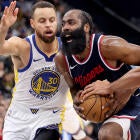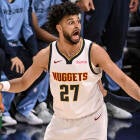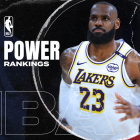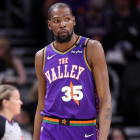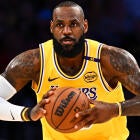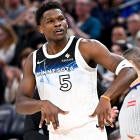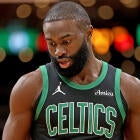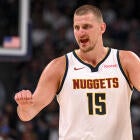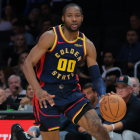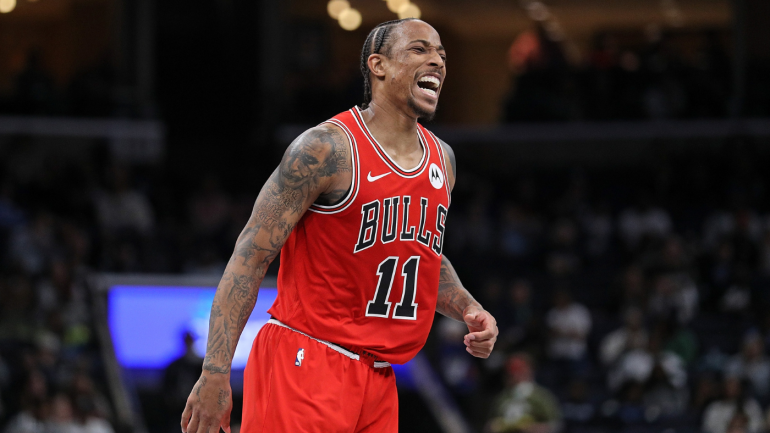
The NBA trade deadline may have passed on Thursday, but this year's transaction period was somewhat unusual. Most of the biggest moves, including blockbusters for James Harden, OG Anunoby and Pascal Siakam, were completed far earlier in the season than most trades of that level. That may have robbed the deadline itself of some tension, but when taken on balance, it means that this year's overall trading period has been far more active than it has gotten credit for.
And, of course, it means that we can't simply evaluate how teams did at the deadline based on the moves they snuck in under the buzzer. So let's grade all 30 NBA teams on all of their trade activity (or inactivity) between opening night and Thursday's deadline. Some teams will earn top marks based on moves they made in October. Others will be punished based on the moves they didn't make on Thursday.
Atlanta Hawks: C
Keeping Dejounte Murray was completely justifiable given the offers that were on the table. He might not have been worth the three picks and a swap they gave up to get him, but from what was being reported, it wasn't clear if teams were even willing to offer two firsts. The Murray-Trae Young fit is awkward and will need to be broken up eventually, but frankly, there was no offer on the table that Atlanta won't be able to match over the summer. Holding Murray made sense.
But holding everyone else? That's a tougher pill to swallow. The Hawks are already within spitting distance of next season's luxury tax, and that assumes that they don't re-sign Saddiq Bey or make any other meaningful additions. There were surely offers for players like Clint Capela and Bogdan Bogdanovic, valuable supporting pieces on bloated contracts that are blocking younger talent. The Hawks needed to move someone, and they might still be able to down the line. But this is a 22-29 team. Keeping it together entirely made zero sense.
Boston Celtics: B+
Xavier Tillman was one of the steals of the trade deadline. While you should take any defensive metric with a grain of salt, EPM, one of the most highly-regarded all-in-one defensive metrics, ranks Tillman as the third-best defender in the NBA this season. Boston gave up only two second-round picks for him. By comparison, the Grizzlies got three second round picks for Steven Adams... who won't play this year. An absolute home run of a bench addition for a Celtics team that badly needed front-court insurance for the 37-year-old Al Horford and the injury prone Kristaps Porzingis. It would have been nice if they could have found a more reliable spare guard than Jaden Springer, but considering the assets they started with, that may not have been realistic. Overall, it was a solid deadline for Brad Stevens.
Brooklyn Nets: C
The Nets likely hoped for a first-round pick in exchange for Royce O'Neale. That may not have been realistic, but second-rounders are still a disappointing return. The Dennis Schroder addition gets Spencer Dinwiddie out of the locker room and at least gives them a viable starting point guard for next season, but he'll also take shots away from the developing Cameron Thomas, and his fit with Ben Simmons, who handles the ball quite a bit when healthy, is also shaky. Finally, every year the Nets hold onto Dorian Finney-Smith, his trade value declines. The Nets had a chance to really shake things up at the deadline and add meaningful future assets. They didn't, and their long-term direction remains in flux.
Charlotte Hornets: A
The Terry Rozier deal was a deceptively valuable trade. They got a first-round pick in a market with very few of them available, and that lottery-protected 2027 choice becomes unprotected in 2028. Jimmy Butler will be 38 in 2027. It's entirely possible that Charlotte walks out of this trade with a valuable unprotected Miami pick in 2028, and they didn't even have to take on long-term salary to get it.
The Gordon Hayward trade was a minor miracle, all things considered. Very few winning teams were positioned to match salary on Hayward's enormous deal, but the Thunder gave the Hornets a pretty promising young guard in Tre Mann for a player who was never staying in Charlotte anyway. Considering how likely a buyout was starting to appear, that's another solid deal.
Getting a top-2 protected first-round pick for PJ Washington was a home run, especially since he's not that much more valuable than Grant Williams, whom the Hornets landed in this deal as matching salary. Remember, they were both free agents last offseason. Washington got $16 million per year. Williams got $13 million per year. Yes, Williams is having a down year, but to swap players so similar in recent value while also getting a first-round pick is an absolute home run. That they also landed Seth Curry, a popular player in the region thanks to his father's ties to the organization, is the cherry on top.
Chicago Bulls: F
There's no worse place to be in the NBA than the middle. The Bulls aren't even stuck there. They're choosing not to leave. They haven't made a trade involving a player in two-and-a-half years, and yet, by all accounts, they want to remain competitive and try to climb the Eastern Conference standings. They're currently three games behind the No. 8-seeded Magic, who are significantly younger and more talented than they are and slipped largely because of injuries. In terms of roster, there's no argument for the Bulls as a top-eight team in the East.
They tried to move Zach LaVine. Nobody would take him. That's out of their control. But surely they could have found a home for impending free agent DeMar DeRozan at the right asking price. Now, their options are to re-sign him to a new, pricey deal or to watch him walk away for nothing this offseason. Neither sounds particularly appealing. Every contender wanted Alex Caruso. More so, given his injury history and the fact that his bargain contract is getting closer and closer to expiring after next season, they were never going to get more than they would have if they'd made him available at this deadline. Again, no deal. They didn't even pick up some spare assets for Andre Drummond, a backup center who could have helped plenty of contenders.
Sometimes teams with the noblest of intentions find themselves stuck in the middle due to circumstances outside of their control. That's not the Bulls. The Bulls are an organization with no plan or direction. There is no overarching strategy behind any of this. They play roughly .500 basketball. They sell a lot of tickets. They don't pay the luxury tax. Rinse and repeat.
Cleveland Cavaliers: B
The Cavaliers didn't need to make a move. If anything, they were better off sitting still. Aside from holding onto their limited assets, they are currently reintegrating Evan Mobley and Darius Garland into the fold after both missed significant time due to injury. The Cavs revamped their playing style during that period, and introducing any new pieces while they figure out how to work with Mobley and Garland would have only made things harder.
Dallas Mavericks: D+
Look, the Mavericks got better. There's no doubt about that. Daniel Gafford immediately becomes one of the best backup centers in the league now that he'll be a reserve in Dallas. PJ Washington is the sort of burly forward that can shoot that they were hoping to land with Grant Williams over the summer. It was clear that the Williams fit wasn't working, so the Mavericks upgraded with a slightly better player.
But remember, Washington only got $3 million more annually on his new contract than Williams did. Both signed last offseason. The league viewed these players as reasonably similar eight months ago. Now, the difference is a lightly-protected first-round pick? That doesn't seem right. The 2028 pick swap they're giving Oklahoma City was an enormous risk as well. Now, the Mavericks don't control any of their own first-round picks between 2027 and 2030. That's a very dangerous position for a team that is not currently in the top four of the Western Conference. If things go south and Luka Doncic ever asks out, they're simply not positioned to rebuild without him.
Denver Nuggets: PASS
The Nuggets made no moves because there were no moves to be made. They've spent their assets and they don't have matching salaries. They have their team and they're fine with it. They were taking this deadline as a pass/fail class and they passed by doing nothing.
Detroit Pistons: B
Giving up second-round picks as the worst team in the NBA is rarely a good idea, but the Mike Muscala and Danilo Gallinari additions have brought badly needed shooting that has helped the Pistons pick up a few wins in their quest to avoid the worst record in NBA history while also relieving them of Isaiah Livers (maybe the worst rotation player in the NBA this season) and the $12.5 million owed to Marvin Bagley III next season. All in all, that's a reasonable trade, especially if they put that cap space to good use.
"Reasonable" is probably the best word to describe the Monte Morris trade as well. A 2030 second-round pick isn't much value, but it's better than losing him for nothing, so good work by Detroit to at least recoup something before Morris walked this offseason.
Simone Fontecchio was an interesting addition, and probably an overpay when you consider that the second-round pick they traded (from either Washington or Memphis) will likely be at the top of the round. Yes, Fontecchio's shooting will help, but Utah is trading him largely because they know he's due for a raise in restricted free agency this offseason. The Pistons would have had the cap space to pursue him then.
However, with the decision to trade Bojan Bogdanovic and Alec Burks on Thursday, the Pistons really needed some extra shooting in the building just for the sake of developing their youngsters, so jumping the gun made a bit of sense. Quentin Grimes will help in that respect as well. Adding a proven yet young 3-and-D player made a whole lot more sense for the Pistons than a couple of late picks, so that Knicks deal was a win for them, even if they will have to pay Grimes soon.
Golden State Warriors: C
The 23-25 Warriors are not good enough to win a championship in their current state. That much is clear, so their failure to make a move of any kind is a bit of a disappointment. However, their problems are bigger than any player available at this year's deadline could have solved. Adding another perimeter defender wasn't suddenly going to turn Klay Thompson into his 2017 self. Why add another ball-handler when Chris Paul should return soon?
Eventually, the Warriors are going to have to settle on a real direction for the end of Stephen Curry's prime. Paying Thompson and Andrew Wiggins long term would be untenable based on the way they've played this season. But the early returns on the new starting lineup with Wiggins, Jonathan Kuminga and Draymond Green in the front court have been promising. There's young talent here that deserves room to improve. This season is probably a lost cause, but that was going to be true no matter what the Warriors did at the deadline. This offseason will be a far greater indicator of what their future will look like.
Houston Rockets: C-
The Steven Adams trade was an odd decision for Houston. The cost was more than reasonable, but Adams won't be able to solve their short-term backup center issues, and there's no telling how valuable he'll be next season as a 31-year-old coming off of a serious knee injury. Yes, having his salary on the books as an expiring deal they can later flip would be helpful, but if the Rockets were going to add a center they couldn't use this season, why not take a higher-upside swing on Robert Williams III for a slightly higher price?
Indiana Pacers: B+
Pascal Siakam has, by and large, been as advertised. He's averaging an efficient 21 points per game, and while the Pacers aren't exactly shutting opponents down defensively, he's had a noticeable impact on that end of the floor. We'll have a better idea of this trade's success once we've seen him play more with Tyrese Haliburton, but considering neither of the first-rounders they sent out in this upcoming draft are expected to be in the lottery, the Pacers have to be feeling pretty good about the cost they paid for a very good player.
Los Angeles Clippers: A
The James Harden trade was criticized by plenty of people (myself included!), but we're all eating our words now. Harden has been excellent after a shaky start. Russell Westbrook has accepted a true bench role and is thriving in limited minutes. Kawhi Leonard looks like Kawhi Leonard again. The cost was considerable, but the deal took a Clippers team that wasn't going to realistically contend for the title and put them smack dab in the middle of the championship hunt. They earn top marks for that alone.
Los Angeles Lakers: C
Standing pat, at least as it relates to making a major move, was probably the right call. The 27-25 Lakers have done nothing since the In-Season Tournament to suggest that they are serious championship contenders, and while they might have surprised us with the right move, it's worth noting that the bulk of last season's Western Conference Finals team is still in place here. If contending was a low-odds outcome anyway, why give up assets when the current group has already defied the odds once? It isn't even clear if a Murray trade was on the board. Including Austin Reaves in such a deal, given his youth and bargain contract, was a wise non-starter.
But the initial post-deadline plans and subsequent reporting on what the Lakers are thinking is less than encouraging. ESPN's Dave McMenamin has reported that the Lakers are among the frontrunners to land Spencer Dinwiddie as a buyout addition, for instance. Dinwiddie is shooting 32% on 3-pointers and, though has decent positional size, is a below-average defender at this stage of his career. Does that sound like an ideal fit for a LeBron James team? The Lakers don't need more ball-handling with James, Reaves and D'Angelo Russell in place.
And then there are the reports from CBS Sports' Bill Reiter and Yahoo's Chris Haynes that the Lakers are holding onto their picks so that they can offer three of them (plus potentially up to three swaps) for a star this offseason. That's a good idea in theory... except it ignores the competition. Three picks is a lot under normal circumstances, except the Nets have eight tradable first-rounders, the Knicks have nine and the Thunder, Spurs and Jazz are all in double digits. They can't win a bidding war. Their only real hope for landing a star is someone aggressively forcing their way to Los Angeles. That might happen. The Lakers can't rely on it. Ultimately, the Lakers may have made the right decision on Thursday, but that doesn't mean they know what they're doing moving forward.
Memphis Grizzlies: C+
The Adams trade was a sad but necessary bit of business. Jaren Jackson Jr. looks to be a full-time (or at least starting) center at this stage, and with Adams on their books, the Grizzlies were already over the projected first luxury tax apron for next season. Now, they're below the tax line and have a bit more maneuverability to retool the rest of the roster this offseason.
The Xavier Tillman trade was a bit more of a puzzler. How he netted less in a trade than Adams despite being younger, cheaper and healthier is a mystery. Memphis could have potentially re-signed him this offseason, though that would have risked jumping back above the tax line. Ultimately, Memphis appears totally committed to Jackson as their center. They'll likely use a minimum-salary or rookie backup next season. That's a risky move, even if it's a financially prudent one in a league with plenty of worthwhile and cheap big men.
Miami Heat: C-
The Terry Rozier trade has looked like a miss so far. Miami lost its first four games with Rozier, and his shooting numbers have been miserable with the Heat. It's too early to write the trade off entirely, especially since it cut Miami's luxury tax bill in half, but the opportunity cost here was significant. Now, Miami has one fewer first-round pick to package for a superstar (Donovan Mitchell?) this offseason. That would have been worthwhile if it had lifted Miami's offense up to a championship level this season. It hasn't thus far.
Milwaukee Bucks: B+
The Bucks got very, very lucky. They had virtually nothing to trade, but still spent the pre-deadline period scouring the league for a sorely-needed perimeter defender. Fortunately for them, the 76ers happened to have one in Patrick Beverley that they no longer had minutes for with Buddy Hield incoming and Kyle Lowry possibly joining him on a buyout. Rarely will a contender give a rival a helpful role player for what the Bucks had to offer, but the stars aligned for Milwaukee here. Would it have liked to add someone a bit younger? Sure. But Beverley is a massive upgrade on what it had and he came within its price range, so nice work.
Minnesota Timberwolves: B
The Monte Morris trade theoretically fills the gaping hole at backup point guard here. Minnesota scores 11.9 more points per 100 possessions with Anthony Edwards on the floor than without him, so another ball-handler was badly needed. But Morris has played only six games for Detroit this season due to injury. That makes him a risky addition. If he's the player he was in Washington and Denver then he'll be a real upgrade for their bench at their weakest position. We'll have to see him actually play before we know how helpful he'll actually be, though.
New Orleans Pelicans: B-
The Pelicans got out of the tax by dumping Kira Lewis Jr. and they gave up nothing of consequence to do so. That's nice work. Rarely do owners deserve credit for ducking the tax, but if the Pelicans are going to retain this core, they are going to have to pay the tax several times in the next few years, so delaying the repeater clock (and the desire to break up the team that comes with it) as long as possible has real on-court value.
New York Knicks: A
The Knicks traded for OG Anunoby and proceeded to win 12 of their next 14 games. If that wasn't enough, Precious Achiuwa, nearly a throw-in to that deal, has filled in admirably for the injured Julius Randle since he went down. The Raptors are happy with how the Anunoby trade went, but they haven't experienced nearly the tangible results that the Knicks have. They improved their team dramatically without giving up a single first-round pick in the trade.
Hey, speaking of not giving up first-round picks, the Knicks also landed Bojan Bogdanovic and Alec Burks to boost their bench offense on deadline day without giving up a first-rounder. Quentin Grimes was worth one to the right team, but he'd clearly fallen out of favor in New York, so moving him for players that can help now amid a string of injuries was a solid move as well.
Oklahoma City Thunder: A
The Gordon Hayward acquisition makes perfect sense for Oklahoma City. They can limit his minutes enough to keep him healthy, but he can provide many of the same things that Josh Giddey does without hurting their spacing. There is a good chance the Thunder just landed a member of their closing five without taking on long-term salary or giving up an essential part of their rotation. That's a major win.
The 2028 pick swap they got from Dallas is another sneaky victory. The Thunder right now simply have more picks than they can actually use. They don't have the minutes or roster spots for low-end rookies. So lately, they've found an interesting workaround. When teams need unencumbered first-round picks for trades, like the Mavericks did with Daniel Gafford, they go to the Thunder. Oklahoma City gives them one of their less valuable picks, and in exchange, they get a pick swap down the line that has a chance to be far more valuable. They did the same thing for the Clippers as part of the James Harden trade, and it's likely a strategy they'll continue to employ moving forward.
Orlando Magic: C
Ultimately, the Magic likely didn't see a trade that moved the needle for them. They're not exactly set as a Play-In Tournament team, but that was their likeliest outcome no matter what, so a move only made sense if it had long-term implications. They didn't see one on the board so they stood pat. Still, given their shooting woes, it's hard to believe that they couldn't have matched the three second-round picks Philadelphia gave up for Buddy Hield. Just a single high-volume shooter would go so far in this offense. Even if the Magic wouldn't have kept that player, that's a clear need that they could have filled for a reasonable price and chose not to.
Philadelphia 76ers: B+
Last seasons' 76ers won just under 66% of their games. On the night of Joel Embiid's 70-point performance against San Antonio, which might wind up being his last healthy game of the season, Philadelphia moved to 29-13. That's a winning percentage just above 69%. Daryl Morey managed to trade James Harden for a haul of future picks and long-term draft capital and his team got better as a result. Yes, Embiid's health puts a damper on that success, but we're judging the moves, not the outcomes. The biggest trade Philadelphia made was an unmitigated success. It helped turned Tyrese Maxey into an All-Star and helped set up the 76ers to potentially win sustainably for years to come.
Their deadline day was largely a positive. Getting Buddy Hield will juice their 3-point volume, something Morey seemingly wanted with the 76ers slipping below league-average in that respect. All it took to get him was a few second-rounders and some expiring contracts. He'll help in the short term, but he won't eat up their cap space this offseason, when they're slated to have roughly $55 million in room to work with. The only thing keeping them from an "A" was the bizarre decision to send Beverley to a Bucks team they're trying to beat, but that will make a whole lot more sense if they ultimately land Kyle Lowry through a buyout. The same logic applies to sending Jaden Springer to Boston. Even if he's not going to help you now (and lately, he at least looked like a viable defender), why offer him to a rival?
Phoenix Suns: B+
Give the Suns credit. They more or less exhausted all of their draft capital in landing Kevin Durant and Bradley Beal, but they got creative in squeezing out a few more assets knowing that they'd need help at the deadline. Throughout the offseason, they picked up spare second-round picks here and there by offering swap rights on top of swap rights they'd already traded, essentially dooming their first-round pick prospects for the foreseeable future, but also giving them just enough left in the cupboard to land a viable 3-and-D wing in Royce O'Neale at the deadline. Phoenix is fully in all-in mode, so as desperate as its future might look, it did a far better job of actually achieving its goal than it looked like it would be able to.
Portland Trail Blazers: D
Malcolm Brogdon is 31 and misses an average of around 25 games per season. Jerami Grant turns 30 this year and has four years and $123 million or so left on his contract after this season. If you were to look up "players whose trade value is likely to decline in the near future," you'd basically get their pictures. Interest in both appeared to be reasonably high. The Blazers chose to keep them.
Maybe they're great locker room fits. Grant plays a position in which the Blazers are fairly thin. But in terms of the window the Blazers are actually building towards, it didn't make sense to keep either of them. The Scoot Henderson-Shaedon Sharpe-Anfernee Simons-2024 lottery pick core is years away from potentially contending. Heck, Brogdon even takes shots and possessions away from those young guards. By the time this team is ready to win, those players are going to be severely depreciated assets. Heck, Grant's contract might be so onerous by then that Portland can't move him. Both of them represent dollars and minutes that would be better spent elsewhere for this particular team, and that's before we consider what Portland could have gotten for either. Keeping one of them might have made some sense. Keeping both was nonsensical.
Sacramento Kings: C+
Do the Kings need an upgrade? Yeah, probably. But the Western Conference standings are far more responsible for the unease in Sacramento than their own performance. Last season, the Kings won 58.5% of their games and finished with the No. 3 seed in the Western Conference. They're at 58% so far this season, but have fallen to seventh simply because the West is stronger. Yes, their net rating has dipped, but functionally, the Kings aren't really in a worse position than they were a year ago. Last season, they just happened to be a bit luckier.
Eventually, they're going to need to find a real perimeter stopper. Kevin Huerter and Harrison Barnes seem more like placeholder starters than long-term building blocks. But there wasn't really a path to upgrading significantly on either of them available in the period leading up to the deadline. They could have made some fringier trades, but none of the players dealt Thursday were obvious fits. Like the Warriors, the Kings are a team to judge in the offseason, not the deadline.
San Antonio Spurs: C-
We've seen what a big difference starting Tre Jones has made for Victor Wembanyama lately. While the Spurs weren't going to take a major swing at point guard so early in his timeline, there were feasible smaller moves available to them that would have helped. Tre's brother Tyus Jones was certainly available, for instance, and would have represented an upgrade and meaningful depth. San Antonio has already locked in a high draft pick this year. There's no longer much motivation to continue losing. The Spurs should have at least sought a minor upgrade to help ensure that Wembanyama's rookie year ends on a bright note. They're going to be fine in the long term, but their lack of activity was disappointing.
Toronto Raptors: B
The Raptors haven't had the immediate returns the Knicks and Pacers have from their blockbusters, but by and large, the moves accomplished what they needed to accomplish. RJ Barrett and Immanuel Quickley both accepted bigger roles without seeing their efficiency dip. They picked up a number of draft picks that should be valuable in the hands of an organization that tends to thrive in the pick 20-40 range. Even if injuries are partially responsible, the Raptors have also taken enough of a step back in the short-term that their odds of keeping the top-six protected pick they owe the Spurs this summer have grown meaningfully. All in all, the Raptors did a good job of picking an organizational direction and sticking with it.
The Kelly Olynyk trade was unusual, but makes some sense in their specific context. The Raptors already had so many 2024 draft picks that dealing one of them probably helps. They didn't have minutes or roster spots available for that many rookies, so they took a swing on another young player they've seen in the NBA in Ochai Agbaji. Could they have flipped Olynyk for more elsewhere? Sure, but having a shooting big man as a developmental tool around young players rarely hurts.
Keeping Bruce Brown was the only move that Toronto is getting dinged for. He's a good player who can help them win next season, but he probably isn't a long-term starter in Toronto, and he's going to make it harder for the Raptors to hold onto their top-six protected pick this year. His $22 million team option is a bit bloated if the Raptors plan to aggressively use their cap space this summer, so he'd likely have to be re-signed to a longer deal at a smaller annual number for it to make sense. Sure, the Raptors could trade him later, or they could just keep him as a high-end reserve, but reloading teams like the Raptors usually benefit more from flexibility than established non-core veterans like Brown.
Utah Jazz: C
The Jazz don't value short-term winning at the sub-contender level. For the second straight season, they've operated as sellers, and it's a bit disappointing when you consider how well they've played since they found the starting lineup of Fontecchio, Kris Dunn, Collin Sexton, Lauri Markkanen and John Collins. Still, if they didn't plan to bring Fontecchio back this offseason, a high second-round pick is a decent enough return. There just wasn't a compelling reason not to keep him. He's still in his 20's, he fits easily on most rosters, and while they owe a top-10 protected pick to the Thunder this year, you could argue that they should be trying to convey it now, in a weak draft class, instead of holding it and potentially losing the pick in a deep future class.
Yet by trading Kelly Olynyk and Ochai Agbaji to the Raptors, they've doubled down on the 2024 class. Not only did they position themselves to possibly fall out of the Play-In Tournament and hold this year's pick, but they added another 2024 pick through that trade. That was a strange decision given the promise Agbaji had shown, but his role had shrunk this season, and the Jazz may have simply decided he wasn't part of their future. Still, they pulled the plug a bit early on what could have been a promising season, and they didn't exactly get a massive return to do so.
Washington Wizards: B
The Wizards may have uncovered a diamond in the rough with this Marvin Bagley trade. The former draft bust has played very well in Washington, and the Wizards got two second-round picks in the deal to take on his contract. Not too shabby.
The Daniel Gafford trade was another winner. While he was productive as their starting center, the Wizards had far more use for a late first-round pick. They are neck-deep in a rebuild and they can now offer more minutes to younger players who figure to be a part of the team's future.
![[object Object] Logo](https://sportshub.cbsistatic.com/i/2020/04/22/e9ceb731-8b3f-4c60-98fe-090ab66a2997/screen-shot-2020-04-22-at-11-04-56-am.png)









